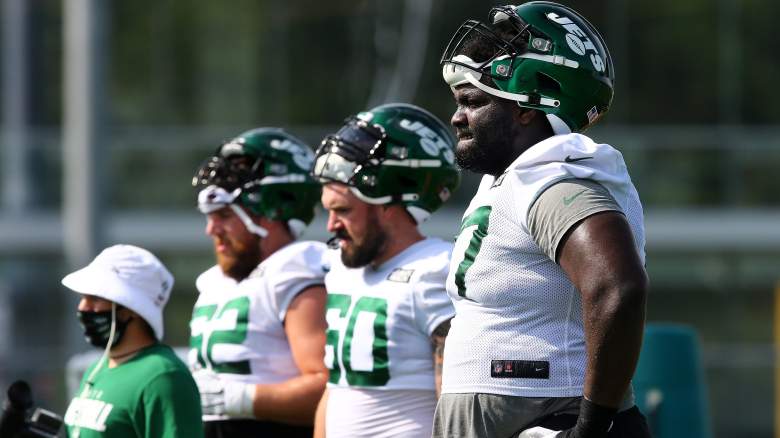
Getty Joe Douglas began building his core by anchoring the offensive line behind Mekhi Becton and Connor McGovern.
Despite his championship past, Jets fans had their doubts about first-time general manager Joe Douglas in June 2019. Nearly two years later, those feelings of uncertainty have been rectified.
It has been a splendid start to the calendar year for Douglas and the Jets, beginning with the hiring of head coach Robert Saleh, the top candidate on the market by most estimations. Offensive coordinator Mike LaFleur and offensive line coach John Benton followed the new boss in his migration from San Francisco to New York. Defensive coordinator Jeff Ulbrich then joined the front office from Atlanta.
The reconstruction of this franchise started long before 2021, however. Douglas began building the organization his way from the moment he walked through the front door of One Jets Drive.
Douglas’ Patient Approach Pays Dividends
The first thing we heard about Douglas (aside from his influence on the Philadelphia Eagles‘ 2017 Super Bowl run) was that he had an unwavering personality. The former college scout has a specific way he goes about creating football teams, and we can now see that shining through this current Jets roster.
After being largely stripped of the 2019 NFL draft and free agency period, Douglas showed extreme patience heading into his first year paired with former head coach Adam Gase. Even with his hands tied, the GM began crafting the core of the future with waiver pickups like defensive end John Franklin-Myers and guard Alex Lewis. Franklin-Myers had 3.0 sacks and 13 QB hits as a rotational piece in 2020, and Lewis has started 21 games the past two Jets campaigns.
The following offseason, the real work began. After promising to fix the Jets offensive line, Douglas spent his inaugural draft pick on stud left tackle Mekhi Becton. He also found a team leader and solid performer in free agent right tackle George Fant, while bringing in Connor McGovern to be the long-term center.
Douglas’ initial draft focused on character and leadership, as well as versatility and need. The Jets drafted five former college captains in 2020, in a clear effort to spark a positive culture. Some of the highlights of the rookie class outside of Becton were wide receiver Denzel Mims, cornerback Bryce Hall, safety Ashtyn Davis, running back La’Mical Perine, and undrafted prospects Bryce Huff (edge) and Lamar Jackson (cornerback).
Then the controversial decision came when the Jets announced they would trade Jamal Adams to the Seattle Seahawks.
The Trade That Saved the Jets
To be a successful general manager, you must be able to separate the fan inside you from the professional at the wheel. Very few Jets fans would have traded away the star of the team before the 2020 season, but it was the right move at the time.
This roster was not a playmaking safety away from a Super Bowl, and Douglas knew that. Instead, he stuck to his plan and utilized his most valuable resource. From this deal, the Jets have already moved up to draft top guard prospect Alijah Vera-Tucker out of USC (with another first-rounder still on the table in 2022).
Of course, another crucial trade still needed to be made for the greater good of the franchise, and Douglas didn’t shy away from this task either. With Sam Darnold dealt to Carolina and Zach Wilson drafted in his place, the full-transition from the Mike Maccagnan era was virtually complete outside of Quinnen Williams, Marcus Maye and a couple other hold-overs.
There were two keys to why the Darnold trade was a must; the Jets brass felt Wilson had the greater career potential, and the move allowed them to reset the quarterback clock in terms of financials.
An Offseason With Purpose
During early 2021, Jets fans have seen an influx of talent under Douglas and Saleh. More encouraging than the actual deals has been the purpose behind them. In free agency, the Jets targeted high-ceiling players who were entering their prime. Edge rusher Carl Lawson (25 years old), wide receiver Corey Davis (26), defensive tackle Sheldon Rankins (27) and linebacker Jarrad Davis (26) all fit that description.
Then in the draft, Douglas rounded out his home-run trot trading up and down with a certain rhythmic brilliance. The first four Jets picks focused on improving the offense, with dynamic slot WR Elijah Moore and elusive RB Michael Carter joining Wilson and Vera-Tucker. The final six picks then bulked the defense.
With the latter six picks, as well as some of the undrafted signings, the Jets enacted a specific gameplan on this side of the ball; get faster and more flexible on defense.
The NFL is changing, with speed at quarterback and skill positions torching defenses left and right Kansas City Chiefs are the perfect example, but the Josh Allen-Stefon Diggs combination inside the division works too. Saleh and Douglas countered this trend by drafting two hybrid linebacker-safeties, Jamien Sherwood and Hamsah Nasirildeen, as well as two speedsters in the slot.
The best pick of all might have been cornerback Jason Pinnock in the fifth, but late sixth rounder Jonathan Marshall (defensive tackle) was highly touted in his own right.
2021 Core Takes Flight
It took some agonizing patience from Douglas and the Gang Green fanbase after a pitiful 2020 campaign, but the new Gotham Jets core is finally here, and this one is built to last.
Although New York is never 100% satisfied, the phrase “in JD we trust” has taken hold with more and more Jets fans as the days in office go by. Saleh said it best: “It will take time, but everything we do is designed to win championships in the future.” It’s hard to argue that a championship roster isn’t being built right before our eyes.